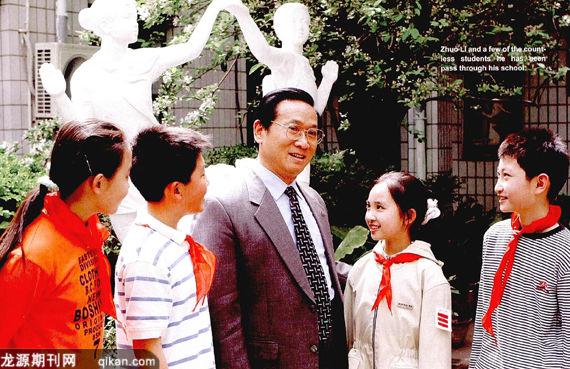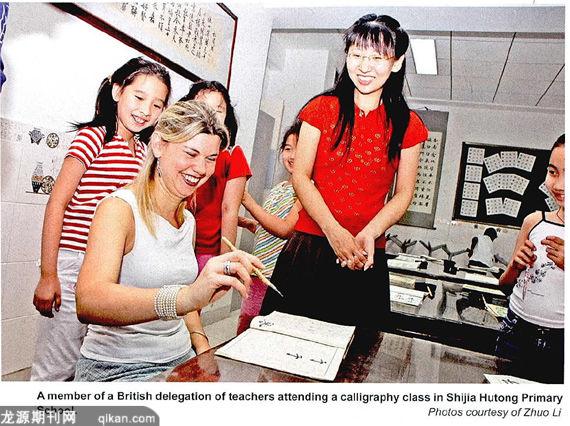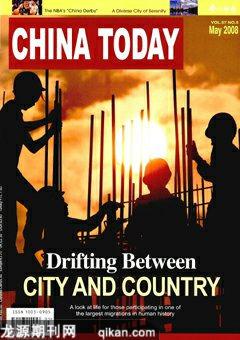A Sound Principal Underlying a Good Education
staff reporter ZENG PING
WHEN Zhuo Li arrived for his first day of teaching at Beijings Shijia Hutong Primary School nearly half a century ago, the school comprised 19 shacks in an abandoned temple. The principal addressed student assemblies through a paper cone in place of a bullhorn. In the intervening 46 years, the school has grown into one of the most prestigious in Chinas capital, complete with modern buildings and top-rate teaching. Zhuo has been instrumental in this development, serving 25 years as deputy principal before becoming the schools principal 18 years ago. His progressive ideas regarding education have helped set the schools tone and make it one of the most highly regarded educational institutions in Beijing.
Based on Zhuos experience across four and a half decades in education, he believes that four in every 1,000 students are exceptionally gifted, while the same number are genuine slow learners. In terms of intellectual ability, the remaining 992 students are largely at the same level. So why do kids of similar ability end up with a huge range of results when it comes to performance in class? Zhuo believes the answer lies in a combination of non-intellectual factors, such as the childs habits, hobbies, reaction to setbacks, and ability to communicate and cooperate with those around him or her.
Love, but Love Wisely
“No TV before finishing your homework!”
“I can do it after this program finishes.”

This is a common enough exchange between parents and children, but for Zhuo Li it is indicative of a dangerous antagonism between the two parties. All parents love their children, but Zhuo believes it is important to love wisely. Some parents overwhelm their kids with extra homework and extracurricular courses that they believe will enhance their childrens chances of entering a top university. This well-intentioned strategy is likely to sow an aversion to learning in young hearts, with excessive pressure engendering a natural resistance in children.
By the same token, lavishing unconditional love and attention can also be damaging – a common problem in one-child families. Many modern Chinese parents overly pamper their kids, only hardening up when they realize their children have been spoiled. But by then it is too late. Zhuo believes it is vital to teach children to appreciate others and repay assistance in-kind. Creating a “no-privilege” environment at home is important in this regard. If sharing is a household rule, children will learn to keep the thoughts and wishes of others in mind. Simple acts, like cutting an apple into three, can send a big message. Zhuo also advises moms and dads to play complementary rearing roles, with the former acting as caregiver and the latter as mentor.
A “hawk and dove” or “good cop/bad cop” approach is also necessary in school. When one teacher reprimands a pupil sternly for behaving badly, another can step in at the right moment with a soft tone and lull a child into spontaneous contrition. In this way, the young transgressor will learn a better lesson from the incident than if a soft or hard approach were used in isolation.
Less Work, More Play
Excessive pressure is probably the most common problem in urban areas impeding Chinese childrens development. These days the walls of urban Chinese schools are plastered with advertisements for various courses in math, computers, English and piano. One of the most commonly seen ads is for “Olympic Math.” Originally designed and intended as a course for a talented minority wishing to participate in the International Math Olympics, the course has become a must for the majority of urban kids, as almost all elite middle schools now use it as a test to narrow fields of applicants.
Zhuo argues that the course is a good mental exercise for children with the requisite ability and interest in math, but for others it is simply a waste of time. As a member of the Beijing Municipal Committee of the Chinese Peoples Political Consultative Conference, he submitted a proposal at two successive sessions to break the link between “Olympic Math” results and middle school admissions. Eventually, the proposal was adopted.
The rise of Olympic Math is symptomatic of the flow-on effects on campuses across the nation of growing competition in Chinas job market. Both teachers and students face increasing pressure to achieve high results. Zhuo Li regards the trend as detrimental, as it means children are given increasingly less time to play. Giving children time to dabble in many fields is vital for their physical and mental development. In the process, they will gradually show a penchant for particular activities. It is not unusual for children to change their minds and skip from one hobby to another, so parents can play an important role in helping their kids make choices and persevere with certain activities.

Allowing Children to Make Mistakes
Teachers in China are often compared to gardeners, tending the young blossoms of the nation. But Zhuo always cautions his staff: “Dont take your ‘gardener status for granted – you could just as easily be a bud-nipper if you do not do your job properly.” Similarly, he also warns parents that arrangements made for children with good intentions, but based on bad judgments, will not yield the desired results.
Zhuos overall philosophy is based on basic respect for children – including respecting their right to make mistakes. This is a view rarely heard in Chinese schools, where rigorism is the norm and mistakes are often harshly dealt with.
The headmaster has found that kids mistakes can invariably be ascribed to limitations of judgment or knowledge – both normal traits of childhood. “Why would they bother going to school if they already knew everything?” he asks rhetorically. Teachers should be aware that students have the natural right to err, and be tolerant and patient. Unfortunately adults are prone to ignore this common sense approach. One day Zhuo Li came across a childs essay that struck a deep chord in this regard. It read: “My hands are small, please dont expect me to do everything perfectly; my legs are short, please slow your pace so I can keep up; my eyes have not seen so much of the world as yours, so please dont restrict my sight…” Adults will never understand a childs mind or actions unless they look at the world from a childs perspective.
Zhuo also tries to keep his mind open and tap into the experiences of peers in other parts of China and around the world. During a visit to Taiwan, for example, he was impressed by the grand graduation ceremonies at local primary schools. At one he witnessed students carried out by their teachers in old-fashioned sedans. In another, students were taken to the seaside and prompted to think about their futures in front of the boundless blue ocean.
On Chinas mainland, many principals maintain a definite distance from their students, appearing only to give lectures and dole out admonitions. In contrast, Zhuo is actively involved in his pupils lives. As a result of his close attention, many students throw themselves into his arms upon graduation, uttering words of thanks.

Zhuo Li is an ardent advocate of the UNESCO doctrine of the “four pillars of education”: learning to know, learning to do, learning to live together and learning to be. He constantly reasserts that the essential and ultimate task of education is not merely the acquisition of knowledge, but the complete development of a person. He therefore calls for an equal and close relationship between teachers, students and parents, to lay fertile soil for a childs all-round growth. Based on this philosophy, Shijia Hutong Primary School has developed a reputation as a place that draws out the best in Beijings youth. For Zhuo Li, thats the best compliment he could hope for.

